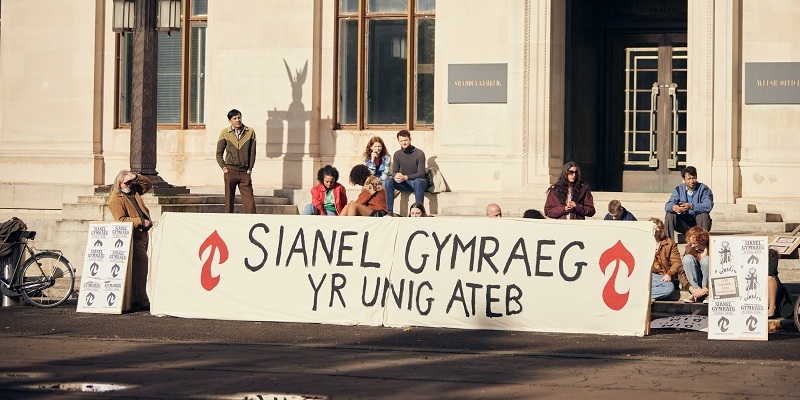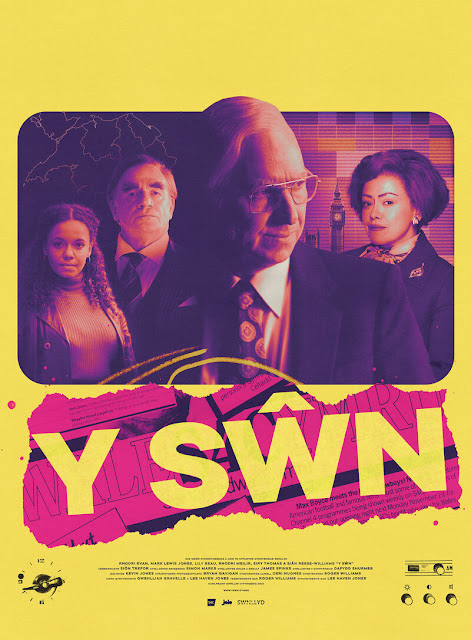
Interview by
Benjamin Poole
Y Sŵn
tells the story of how the UK government of 1979 U-turned on a promise to
establish a Welsh language TV channel, sparking a wave of civil
disobedience.
We spoke to the film's screenwriter and producer,
Roger Williams.

Hello Roger. Congratulations on Y Sŵn, which I really enjoyed.
It's so poppy and plays very different to how I initially imagined a
drama about the establishment of a niche television channel would. I
wonder if you wouldn’t mind giving a bit of background on the genesis of
Y Sŵn, please.
The background for Y Sŵn was me realising that Channel Four
and S4C were about to be 40 years old and how much I, as a man in my late
forties, didn't know about the story and not understanding why Thatcher's
government changed their mind about the commissioning of S4C. And the more
I found out, the more I realised that there are generations who don't know
the story either.
I think we're sometimes bad at putting Welsh history on screen, especially
contemporary Welsh history. The Welsh channel is now something we've come
to accept, and it is important politically, socially and culturally. Yet,
when the 2010 coalition came in, looking for cuts, they went at S4C. I was
chair of the Writer's Guild at the time, and we aimed to withstand any
designs to get rid of the channel. We could still lose it - all it would
take is a government to come in and decide to change it. And so,
Y Sŵn is about not taking for granted certain institutions,
and also holding other institutions to account. We live in an age where
there are hundreds of TV channels, but S4C is still important. The film is
a challenge to the policy makers, asking what happens next, especially the
end.
The end! It threw me! (SPOILER ALERT: Something narratively unexpected
happens at the end of Y Sŵn)
Yes, that cut of them staring at the audience, as if asking us to consider
the importance of Welsh talent. In Y Sŵn, we cast Welsh actors, 90% of which started in S4C. For instance,
Mark Lewis, who went on to star in Outlander and was
even in a Star Wars (The Last Jedi). The television and film industry we have here (here Roger is referring
to the amount of British and international shows which are made in Wales),
wouldn't be as viable if not for the work S4C has done with indigenous
talent; they've trained make-up departments, art departments, camera
crews. All these people existed when Dr. Who landed. It is
an ecology we shouldn't take for granted.
What research did you engage in for Y Sŵn?
I read everything I could, and I spoke to a lot of people who were part of
the story. People who protested, people who went to prison.
Wow, how did you find these people?
Some are public figures, for instance Rhodri Williams, who features in the
film in archive footage. He's now the chair of the S4C authority, there
are very public records concerning him. Other people I tracked down using
emails. Their concern was what my "take" would be before they shared their
stories. With Gwynfor Evan, I spoke to his daughter and his son in law.
And there was Rhys Evan who wrote the authoritative biography Gwynfor,
just this huge book. I had lots of conversations with people, and then had
to try and forget it and just remember what was important! The original
script was still 50 pages longer than the one you saw today.
It is highly informative and clearly researched with care, but with
that I was struck by how playful and vivid Y Sŵn is too, with its
use of different film textures and expressive editing...
We didn't want the film to be a dull watch. It needed to live on the big
screen. So, we looked into different aspect ratios, visually exploring
what we could do so it could earn its place up there! It is very
cinematic, but the devices such as the colours and the aspect ratios are
used to give clarity to the story. For (director) Lee Haven Jones,
the Welsh scenes felt more intimate, and the scenes in London which are in
black and white have a thematic distance. Especially in the presentation
of Gwynfor's house.
That house was so cosy! So much so with the Christmas scenes! Speaking
of cosy, what are your earliest memories of S4C?
There was a test broadcast, just this five minutes on a loop. I remember
sitting in front of that and wondering what would happen! There was a lot
of hype surrounding SuperTed (a Welsh superhero animated
television series about an anthropomorphic teddy bear with superpowers)
that was the first programme, following the initial welcome and hello.
Gosh, SuperTed was the first show? I love SuperTed.
Remember Texas Pete? What was his deal? (Texas Pete was Ted's cowboy
antagonist, who reads today as a blunt rebuttal to American cultural
imperialism).
Yes, you could psychoanalyse Texas Pete!
If you were going to programme Y Sŵn with two other films what
would you choose?
Crikey! That's a really good question. Absolutely the first one I would go
to would be Coming Up Roses, the Welsh title is Rhosyn a Rhith. I was 12 or 13 when it came out, and it was the first Welsh language
film I had seen in cinemas, in the Lyric in Carmarthen. It's a great film.
I saw it featured on the BBC lunchtime news, where the story was it
playing at the New York Film Festival. A young Welsh speaking man in
Carmarthen, this was impressive to me: a film in Welsh travelling the
world! It was a massive influence to me, and encouraged me to go into film
and TV (An interjection: Roger's enthusiasm for
Rhosyn a Rhith is delightful. It's clear he loves films).
It's a great film, sort of like Pride or
Brassed Off. It works really well... And as for the second film (there is a pause
here as Roger takes the question seriously) ...All About My Mother. It seems random, but at its heart it has a very political agenda, yet
the way in which it tells the story with emotion. Which is similar to
Y Sŵn. What you get from Y Sŵn is an understanding of the
extreme emotions at play, and of the love story between Gwynfor and
Rhiannon. The political and the emotional band together!
Thanks Roger, best of luck with Y Sŵn! It deserves to find an
audience. I'm off to try and see Coming Up Roses, now.
You'll probably find it on S4C!
Y Sŵn is in UK cinemas from March 10th.
